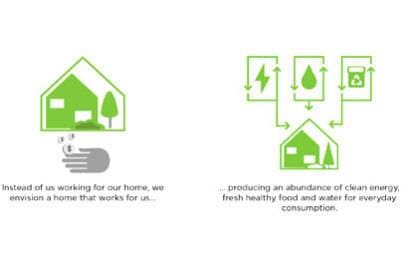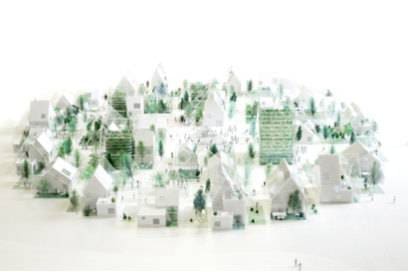September 3, 2024, 6:43 am | Read time: 4 minutes
Soon, it will be possible to live self-sufficiently in small communities in a village in the Netherlands while leading an ecologically conscious life. Such a village is also planned in Germany. The project is called “ReGen Villages”. A way of life for the future? TRAVELBOOK spoke to the founder, James Ehrlich.
Can you imagine being part of a small community where you grow your own vegetables, share a fruit tree with your neighbors and live in an environmentally conscious way? A place where you are completely independent and not reliant on food from the supermarket and electricity from large suppliers? If this idea appeals to you, you will love the “ReGen Village” project.
The visionary project, launched by entrepreneur James Ehrlich and the Danish architecture firm EFFEKT, is planning a big step back to nature. The focus is on independent and ecological forms of living. In more specific terms, this small community is self-sufficient in food, energy, and fresh water, and it also recycles its own waste. “ReGen stands for regeneration. The output of one system is the input of another,” explains founder James Ehrlich in an interview with TRAVELBOOK. This creates a biological cycle within the villages.
Global warming is prompting a rethink
Environmental awareness has changed significantly in recent years. Buzzwords like global warming and sustainability are inspiring many to reconsider their lifestyles, fostering a desire for a more minimalist and natural way of living. According to Ehrlich, the trend is moving away from the big cities. In the future, high-speed rail links will enable us to commute swiftly to the city while still enjoying the benefits of a countryside home. James Ehrlich sees the future in his very special eco-villages: “If you look at the development of housing, it’s a revolution – but in terms of reality, it’s the only way forward.“

The visionary describes the “ReGen Villages” to TRAVELBOOK as the “Tesla of ecovillages”. He is referring to the US company Tesla Motors, which specializes in building electric cars. Both companies share a common goal: to forge an environmentally friendly and progressive alternative to the prevailing lifestyles of the masses. “We are doing everything we can to ensure that families are well provided for in a changing economic and environmentally conscious future.”

Ehrlich’s greatest motivation was his son
For eleven years, Ehrlich has been working on the topic of what a self-sufficient and minimalist life could look like. Although the idea of living in small natural communities is not new, Ehrlich has taken the concept one step further and transferred it to a global level. “The defining moment came when I gazed into the eyes of my then two-year-old son and envisioned him asking me in 30 years: ‘Where were you, and what actions did you take?’ That was probably the biggest motivation,” he explains to TRAVELBOOK.
Almost like 70 years ago again
As you can read in the Rockefeller Report 2013, society used to function very similarly. Until 1950, 75 percent of the world’s 2.2 billion people lived in small communities that were self-sufficient – very similar to Ehrlich’s ReGen Villages project. “Self-sufficiency regarding food, water, energy, and waste management within a small community may well be the sole viable way for humanity to live in the future. Especially when you consider that ten billion people will be living on Earth by 2050,” summarizes the idea generator.
The villages are planned for various locations: The first village of this kind is set to open in Almere, a city in the Netherlands, in 2018. 150 to 200 families are to find a new, environmentally friendly home there. Houses and apartments will be available for rent or purchase, with reduced rents as a reward for commitment to the project. There will be an app to calculate this.

The island that one man built entirely out of garbage

Bridge Over the Red Sea to Connect Megaproject Neom With Egypt

Must-See Musicals for Your Next London Visit
You can put your name down for the villages
Interest is high: numerous applicants have already registered for the ReGen Villages. You can already register for a potential place on the website. “I think people have had enough of communities that don’t make sense,” says Ehrlich, explaining the high demand. There’s a renewed desire among people to find meaning in their behavior, consumption habits, and overall lifestyle.
A ReGen Village is also planned in Germany: “We are currently looking at a few very interesting locations in Germany. A location in Bavaria, near the TU Deggendorf, is of interest for a regenerative dormitory for 600 students, and we are also looking at some areas around Hamburg and Berlin.” The decisive factors for the location are that there are universities nearby, that there are investors and partners, and that the government is significantly involved.

